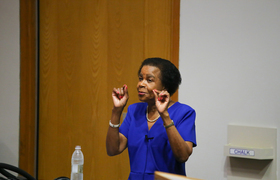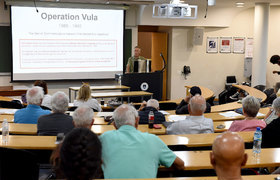Elections 2024: Political parties mobilise youth participation
15 February 2024 | Story Kamva Somdyala. Photos Je’nine May. Read time >10 min.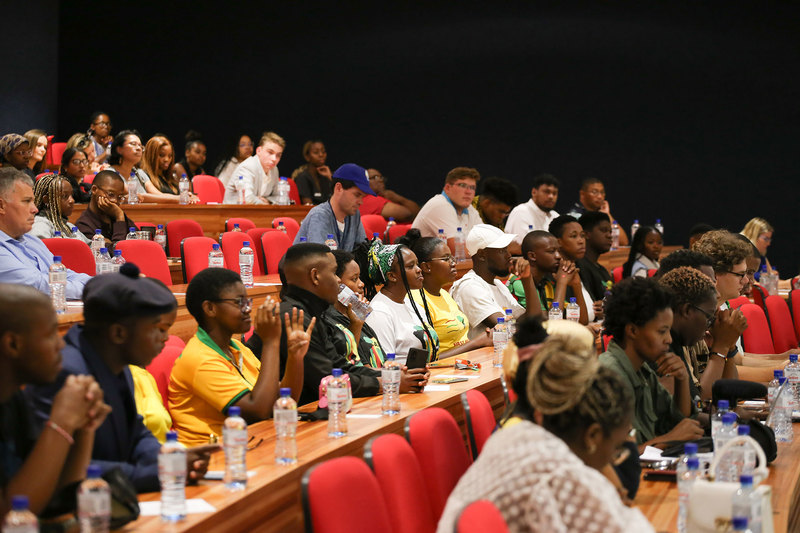
As the country awaits a national election date from President Cyril Ramaphosa, the topic of conversation during a recent political party debate was: How can we ensure that young voices in elections and governance are heard? The event was hosted by the University of Cape Town’s (UCT) Department of Student Affairs (DSA) in conjunction with the Danish embassy’s youth advisory panel.
The significance of this year’s poll is that it also marks 30 years of democracy for South Africa; and the dialogue was graced by representatives from the United Democratic Movement (UDM), GOOD party, RISE Mzansi, the Economic Freedom Fighters (EFF), Build One South Africa (BOSA), ActionSA, the Democratic Alliance (DA) and the African National Congress (ANC).
Opening proceedings, the Danish ambassador to South Africa, Elsebeth Søndergaard Krone, said that regardless of the election outcome, Denmark will remain a partner of South African government and the South Africa’s people.
“We believe it’s important for the youth to engage in politics and in their democracy. The youth is not the future. It is the present,” said Søndergaard Krone.
She also reminded the audience that many countries will be heading to the polls this year. According to a TIME article, “globally, more voters than ever in history will head to the polls as at least 64 countries (plus the European Union) – representing a combined population of about 49% of the people in the world – are meant to hold national elections, the results of which, for many, will prove consequential for years to come”.
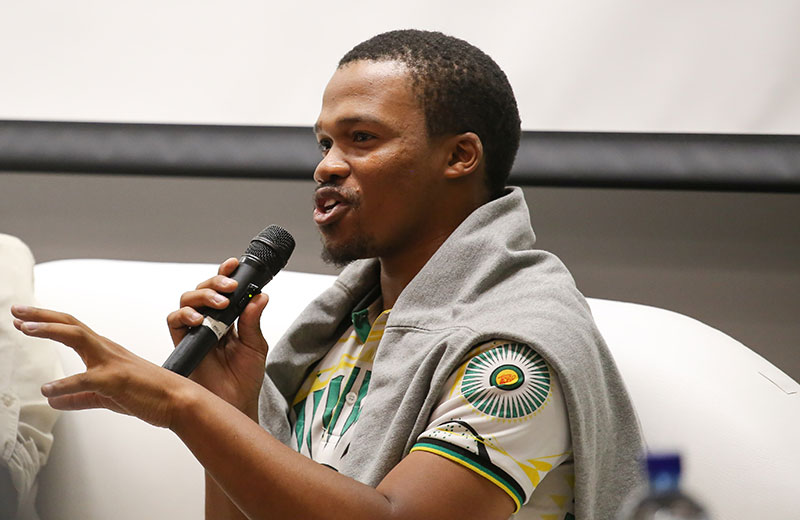
Giving his input during the debate, which was moderated by Rivonia Circle’s Naledi Ngqambela, UDM secretary-general, Yongama Zigebe, said that he is proof of the country’s youth-focused future – being the youngest person to hold the position since the party’s inception in 1997.
“What we did is fight. We had to fight to get the youngest secretary-general in the country, and that’s me. We sit in the National Executive Committee (NEC) and try to change the mindset of a party that’s gone 27 years without robust and young views. The use of social media is big for us, and we take the views there because when you bash us, we need to be better.
“If you look at our manifesto from 1997 to 2019, it is silent on elements of the creative sector being professionalised. It did not [include] the LGBTQI community and issues of gender-based violence (GBV). In our manifesto launch coming in March, those are the things that you are going to see because these are things affecting young people daily. And these issues have been amplified by youth voices in those spaces.
‘Slow and not inclusive’
Representing GOOD – a party formed on the eve of the last general elections in 2019 – Kaden Arguile revealed that the party only recently held its National Leadership Committee (NLC) gathering in 2023, where he was elected.
“It’s very much [a case of] ‘If you want something done, get it done yourself’. As soon as you have that framework, start speaking with the community around you and see if they agree with the ideas and causes you want to pursue.”
Arguile mentioned that the party did a lot of work at the NLC for their manifesto – which will be launched soon – on matters pertaining to green and renewable energy, as well as a clean and climate-secure South Africa.
“There was a lot of youth debate to understand where we fall on that spectrum but also elevating those voices. We already have a youth councillor in the Drakenstein municipality. We must have a balance where you have someone who can handle the responsibilities and pressure that come with that, while having youthful energy to engage and disrupt the system we have right now, which is too slow and not inclusive.”
“When we say we want to cultivate policies and people have solutions, we need to find space where they can engage.”
One of the so-called new kids on the block, RISE Mzansi, represented by Irfaan Mangera, painted a picture of a party that “meets people where they are”. Mangera explained: “We recognised, from the formative stages, that what is missing is a listening type of politics: go and meet people where they are – and listen. Our policies and manifesto have been informed by this. What I mean by this is when we say we want to cultivate policies and [there are] people [who] have solutions, we need to find space where they can engage. We have engaged young professionals, hosted arts and culture workshops, workshops around GBV, mental health forums [and] sports tournaments where discussions are had.”
He added: “At 27, I sit on the national leadership of RISE and share the space with several young people. The leadership of RISE is youthful, but it’s not young people in its entirety. We created enough space for an intergenerational mix.”
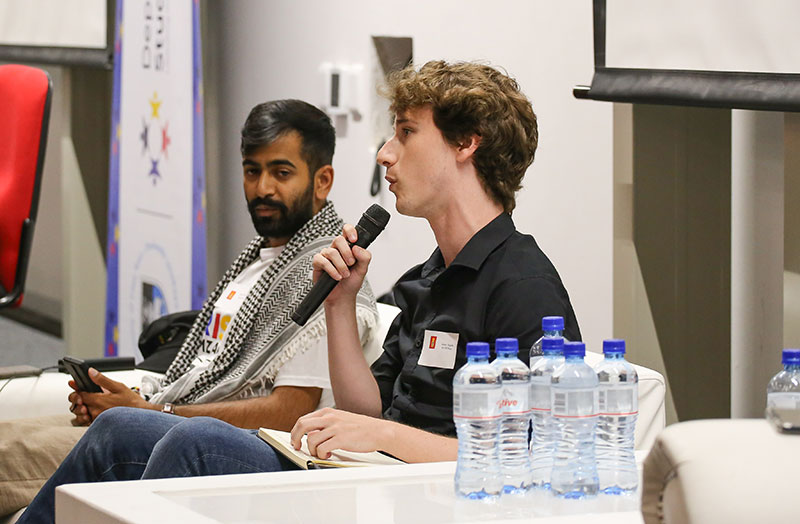
The EFF pointed to the elevation of former Fees Must Fall activists and student leaders to Parliament. Siya Nyulu, who represented the organisation at the debate, said “They [youth] are not only in the legislature, but represented at national level in our central command team and war council, where the EFF has meetings about the daily operations of the movement.
“The EFF doesn’t talk about youth empowerment on paper, we implement at various structures. Even at institutions of higher learning, we lead students’ representative councils. Our EFF student command is crucial because usually if you are part of this structure, you get an opportunity to be part of the national structure by, for example, being deployed to Parliament.”
“The leadership of RISE is youthful, but it’s not young people in its entirety.”
BOSA’s Arthur Mexico said, “How we have created an environment that enables youth representation in governance is through our recruitment process and candidates. We have allowed for members of the community to nominate people who they see fit to represent them in Parliament – youth included. Engagement for us is a big thing throughout our leadership levels.”
Mexico continued: “One way we do this, for example, is me having access to our national leadership, including the president and deputy. This is pushing a culture where youth do not have to fight to voice their opinion and do not have to scramble to get positions of influence within the organisation. We also make use of social media and our efforts there are in recruiting and collecting insight and information to understand from the youth what it is that we need to focus on as a party.”
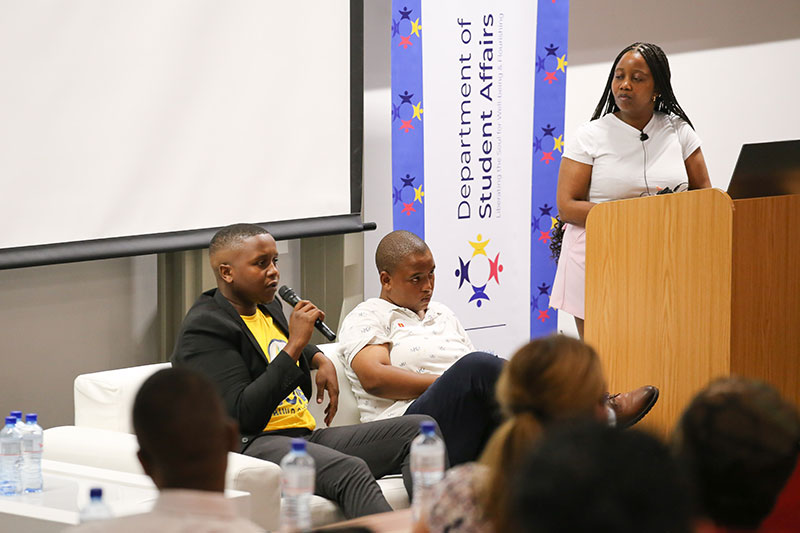
ActionSA has two permanent seats for the youth in its highest decision-making body (Senate), Stephen Gerber told the audience. “We are a party that believes it’s not politicians that are going to fix our everyday problems, it’s professionals and young people. We will be discussing our student funding policy soon, which is spearheaded by the youth and students’ forum. The youth has been involved in the funding process for something that will replace the National Student Financial Aid Scheme (NSFAS) at the end of the day.”
Education, employment
Education and employment are the two critical issues facing young people, said Nicholas Nyati from the DA. “The Western Cape is not perfect, where the DA governs, but young people are able to get jobs at least. In 1994, our parents voted for their freedom, in 2024, as young people we will have to vote for our survival.”
Simphiwe Silwana, from the ANC, said the youth finds representation in many of its structures up to and including the highest decision-making one – the NEC. “What is unique about the ANC is that we are part of what is called the mass democratic movement, meaning that young people are able to participate in the many structures available. Those structures can be seen as what I would term in liberal forms as lobby groups within the ANC to push the ANC towards a particular direction.”
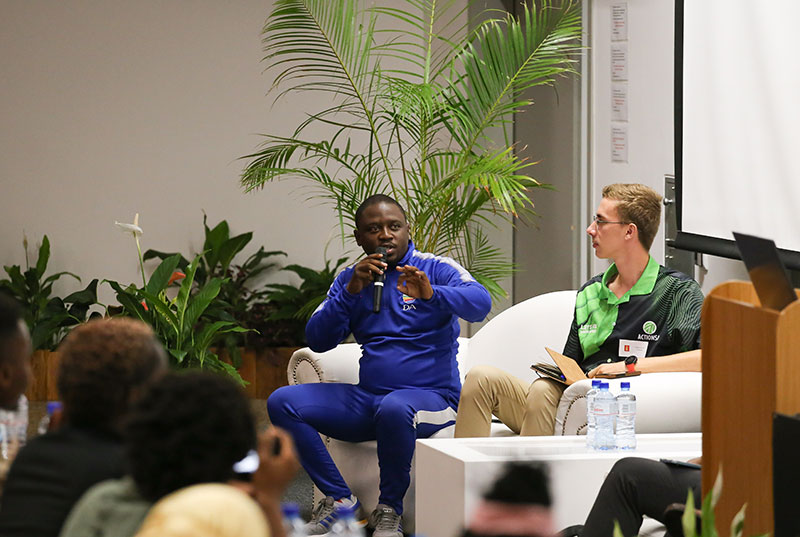
Silwana added: “There is a long way to go. We do understand the frustrations of young people across the board in South Africa when it comes to the ANC. We are working towards ensuring young people participate fully in the body politic of our organisations. I say to young people – with myself included – we must participate and be part of politics, so we are able to have influence.”
 This work is licensed under a Creative Commons Attribution-NoDerivatives 4.0 International License.
This work is licensed under a Creative Commons Attribution-NoDerivatives 4.0 International License.
Please view the republishing articles page for more information.








